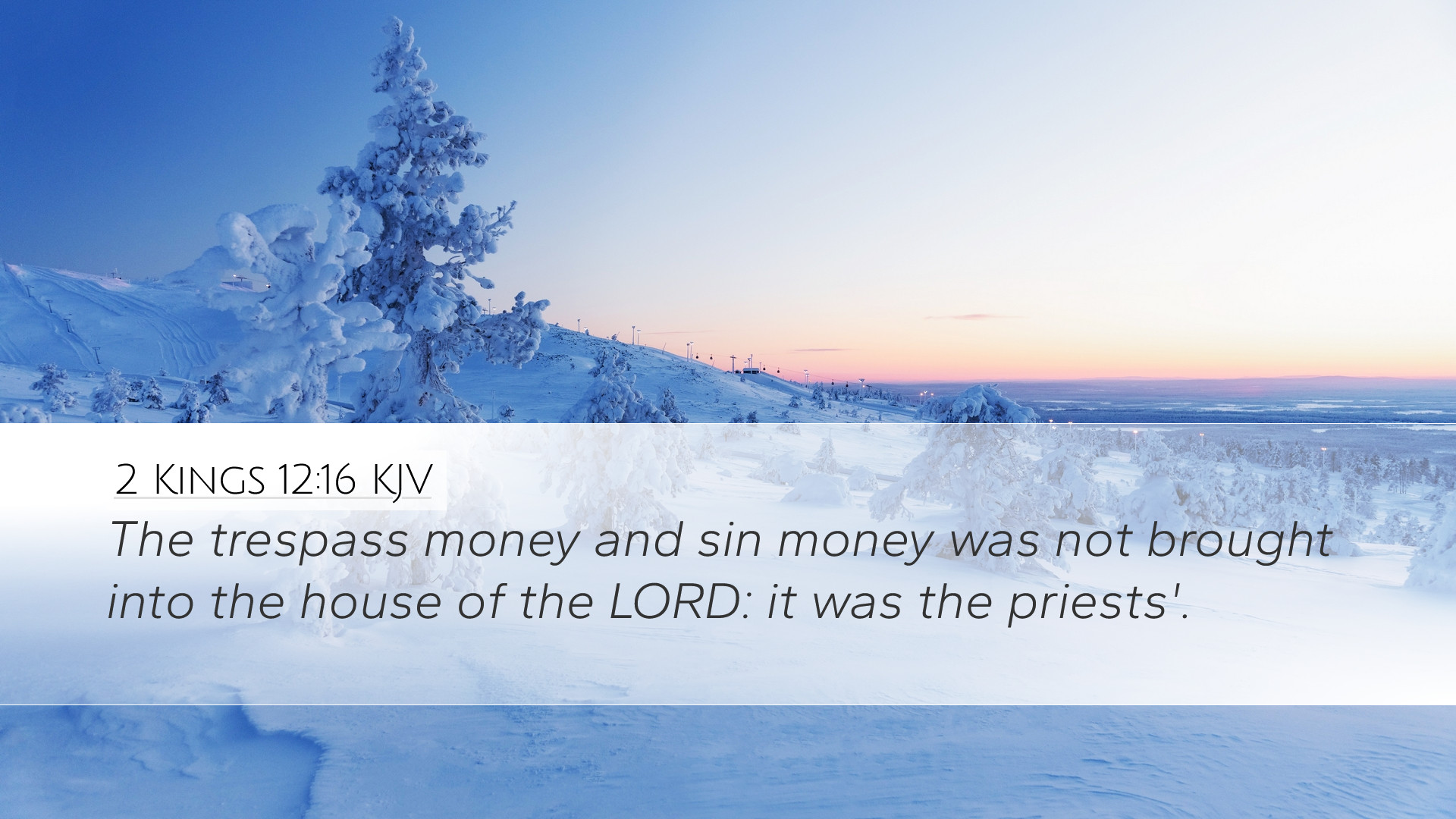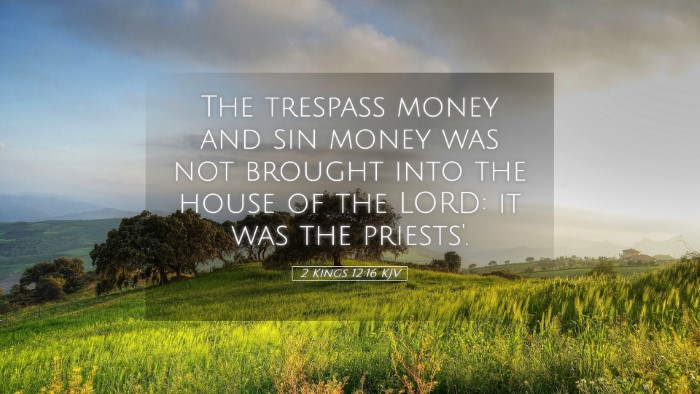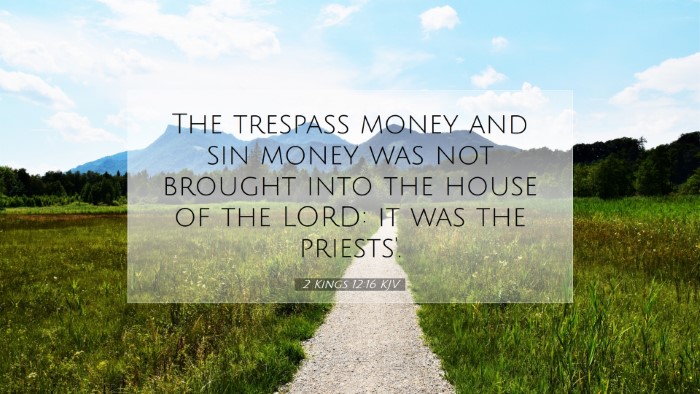Old Testament
Genesis Exodus Leviticus Numbers Deuteronomy Joshua Judges Ruth 1 Samuel 2 Samuel 1 Kings 2 Kings 1 Chronicles 2 Chronicles Ezra Nehemiah Esther Job Psalms Proverbs Ecclesiastes Song of Solomon Isaiah Jeremiah Lamentations Ezekiel Daniel Hosea Joel Amos Obadiah Jonah Micah Nahum Habakkuk Zephaniah Haggai Zechariah Malachi2 Kings 12:16
2 Kings 12:16 KJV
The trespass money and sin money was not brought into the house of the LORD: it was the priests'.
2 Kings 12:16 Bible Commentary
Commentary on 2 Kings 12:16
Verse Text: "The trespass money and sin money was not brought into the house of the LORD: it was for the priests." (2 Kings 12:16, KJV)
Introduction
The passage of 2 Kings 12:16 highlights an important aspect of temple finances during the reign of King Joash. This verse underscores the allocation of certain funds, specifically the trespass money and sin money, which were intended for the priests. Understanding this verse requires an exploration of the sacrificial system in Israel, the role of the priests, and the implications of financial provisions for temple ministry.
Historical Context
This verse is situated during the reign of Joash, a king who initiated significant reforms in Judah, particularly concerning the restoration of the temple. The funds referred to in this verse specifically relate to the offerings made by the people for atonement and the maintenance of their covenant relationship with God. In Levitical law, this financial provision played a crucial role in sustaining the priestly ministry, which was essential for Israel's worship.
Commentary Insights
Matthew Henry's Commentary
Henry notes that this verse reflects the proper management and use of sacred funds. He emphasizes the necessity of ensuring that offerings meant for atonement and support of the priests are directed to their intended purposes. He remarks that the allocation of these funds not only sustains the physical needs of the priests but also symbolizes spiritual righteousness in the community. Henry warns against the misappropriation of sacred funds, reminding readers that failing to honor such financial commitments can lead to judgment.
Albert Barnes' Notes
Barnes points out that the priesthood was vital to the religious life of Israel. The sin offering and trespass offering represented vital elements in the covenant relationship with God, providing atonement for sin. He explains that while the funds were designated for the priests, the broader community of Israel played a part in ensuring that these financial contributions were honored. The priests, as intercessors, depended on these offerings, and thus there is a moral imperative for the people to fulfill their part diligently. Barnes connects this financial responsibility with the community's spiritual health, suggesting that proper funding of the priesthood reflected their commitment to God.
Adam Clarke’s Commentary
Clarke discusses the significance of the categories "trespass money and sin money." He elaborates on the theological implications behind these terms, noting that these funds were related specifically to violations of the Law of Moses, emphasizing the covenantal consequences of sin. Clarke mentions that the designation of these funds for the priests serves a dual purpose: it supports the temple ministry and reinforces the communal awareness of sin and atonement. He stresses that the wellbeing of the priesthood is intrinsically linked to the spiritual state of the nation, and thus neglecting the financial obligations owed to them could jeopardize the people's relationship with God.
Theological Implications
2 Kings 12:16 serves as a reminder of the sacred duty that communities have towards their religious leaders. The funding of the priests is not merely a logistical concern but is deeply tied to the spiritual wellbeing of the entire community. The Temple's role in maintaining the relationship between God and His people is magnified by the proper management of these funds.
Accountability and Stewardship
Another layer of understanding comes from examining the notions of accountability and stewardship. Each community member is called to participate in the support of divine worship, illustrating a collective responsibility towards God’s work on earth. This concept remains relevant for modern church communities regarding the care and support of their ministers and the mission of the church as a whole.
Application for Today's Church
In applying this passage to contemporary times, ministers and church leaders are called to maintain transparency and accountability regarding church finances. Church members are encouraged to understand their role in supporting ministry through their contributions and recognizing that these resources are ultimately meant to glorify God and further His kingdom.
Importance of Financial Integrity
Maintaining financial integrity, just as reflected in 2 Kings 12:16, is essential for building trust within the church community. Churches must ensure that funds collected for specific purposes are used accordingly, advocating for a spirit of integrity among congregants and leaders alike.
Conclusion
2 Kings 12:16 provides vital insights into the intersection of faith, finances, and communal responsibility. By confronting the historical context, theological implications, and modern-day applications of this verse, we find a rich resource for fostering a spiritually healthy community. As we reflect on this scripture, it becomes evident that proper management of God’s resources serves not only practical needs but also spiritual ones, underlining the necessity of honoring our commitments to God’s work through His appointed servants.


